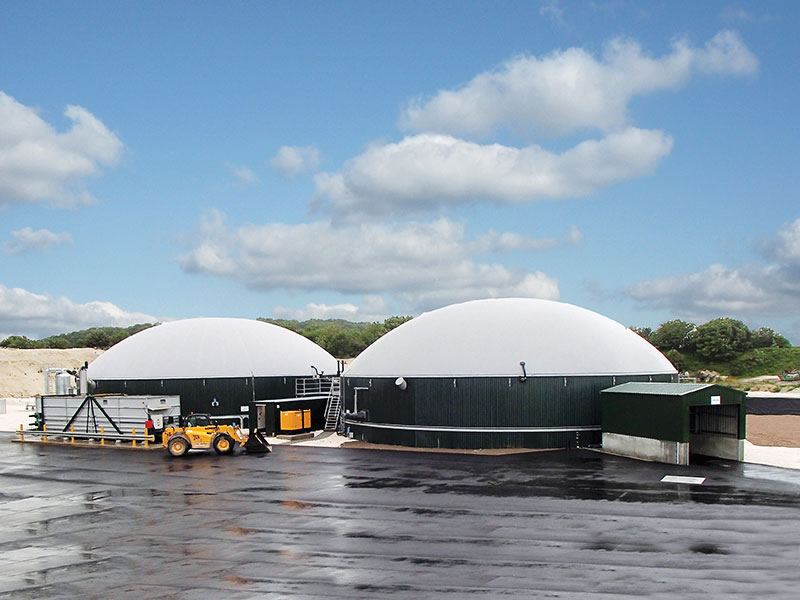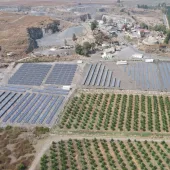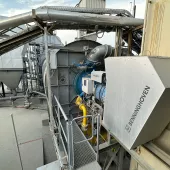Singleton Birch Invest in Renewable Energy Technology

First published in the October 2014 issue of Quarry Management as Anaerobic Digestion
Singleton Birch invest £5 million in renewable energy technology at Melton Ross
Singleton Birch use a substantial amount of energy in their industrial lime processing operations, which is why, as part of their continuing objective to mitigate the environmental impacts of their activities, they decided to embark upon a project to look at ways of reducing their carbon footprint, controlling their energy costs, and reducing their reliance on grid electricity by increasing the proportion of energy they use from renewable sources.
After some two years of research and investigation, the company reached the conclusion that an anaerobic digestion facility would best meet these objectives. Anaerobic digestion (AD) is the process whereby plant and animal material (biomass) is converted into useful products by micro-organisms in the absence of air (anaerobic conditions). Biomass is placed inside sealed tanks where naturally occurring micro-organisms digest it, releasing methane that can be used to provide clean renewable energy.
The biogas produced by this process can be combusted in a combined heat and power (CHP) station to generate both electricity and heat. Alternatively, the biogas can be injected into the national grid as natural gas or used as bio-methane road fuel. The material left over at the end of the AD process (digestate) is rich in nutrients and can be used as a bio-fertilizer to replace the artificial fertilizers which are a major generator of greenhouse gases. The whole process has a significant impact on carbon reduction (see fig. 1).
Having settled upon anaerobic digestion as the way forward, earlier this year Singleton Birch commissioned a new AD plant at their energy-intensive Melton Ross lime works. Having secured a biomass feedstock from a local farming consortium, the new AD plant – which represents a
£5 million capital investment in the north Lincolnshire site – was officially opened this summer and is now set to play a significant role in managing the quarry’s multi-million pound annual energy bill by meeting a significant proportion of the site’s energy needs, as well as creating two new jobs.
Construction of the new facility commenced last year and was project managed in house by Singleton Birch, with the key technology components provided by PlanET Biogastechnik GmbH, a specialist German firm that has installed more than 300 anaerobic digestion facilities around the world. The plant itself is a 1.5MW anaerobic digestion (AD) facility constructed on 2.2ha of a former stockpile area at Melton Ross. The facility’s two digester tanks and six 250kW CHP gas engines will generate 12,000MWh/year of electricity which will be consumed at the lime works, meeting some 40% of the site’s power consumption and helping to reduce its £10 million annual energy bill.
The energy crops that provide the biomass feedstock for the anaerobic digester are being supplied on a long-term contract by the North Lincs Energy Growers Ltd, a consortium of four local farmers, all based within a few miles of the quarry, who each year will provide around 30,000 tonnes of maize, sugar beet, grass, manures and slurries.
Operation of the AD facility at Melton Ross represents phase one of a two-phase programme. In phase two Singleton Birch plan to look at various add-ons, including use of the waste heat from the CHP station to form part of the industrial process used in lime production. The company is also looking to build upon the success of this project by constructing and operating a further four anaerobic digester facilities at other sites in the area. Richard Stansfield, managing director of Singleton Birch, said: ‘We are big energy users and to be able to control our own destiny on that front is really important for the company. Planning permission is already being sought for two additional energy-generating units, and a potential further two have also been identified.’
- Subscribe to Quarry Management, the monthly journal for the mineral products industry, to read articles before they appear on Agg-Net






